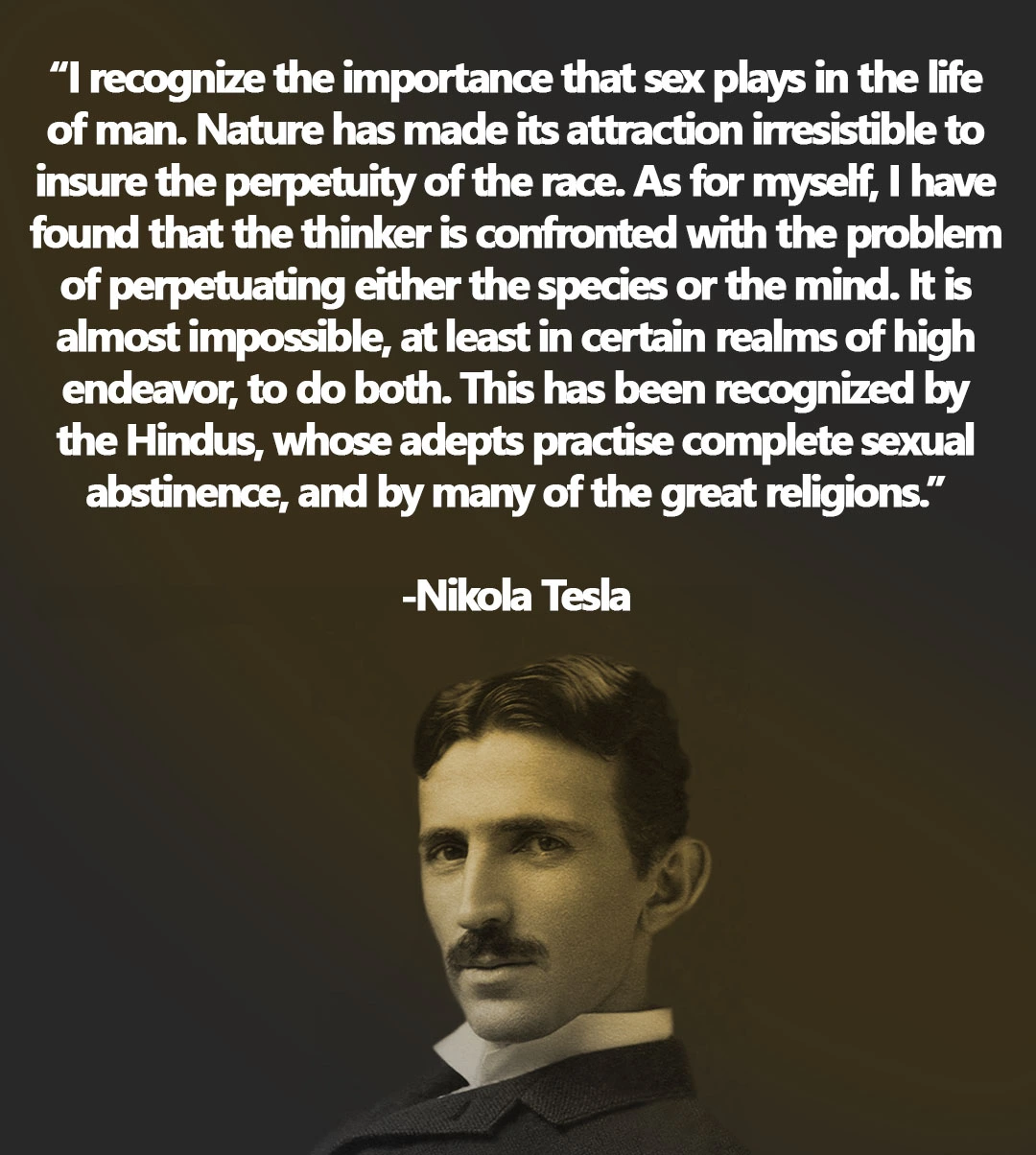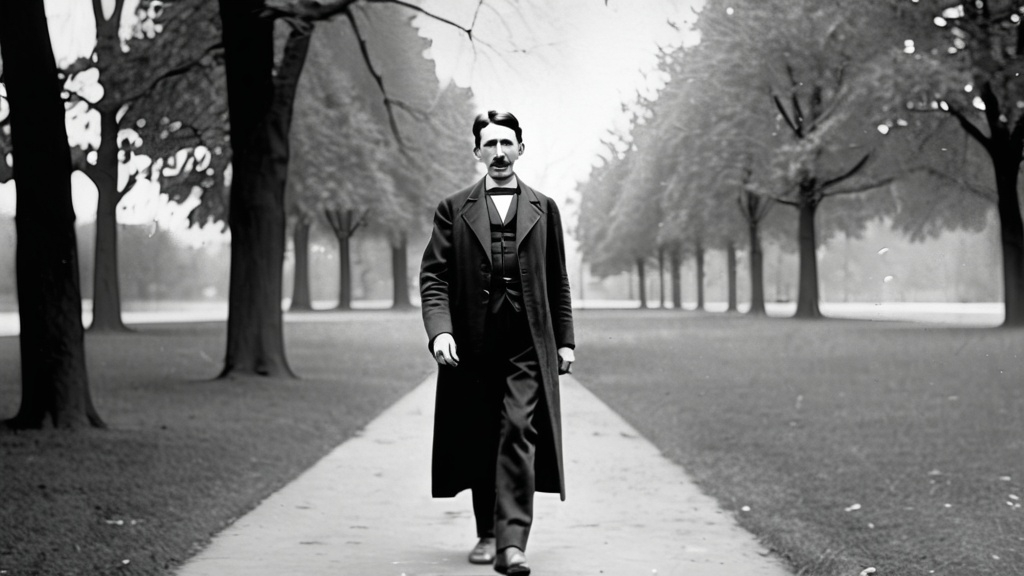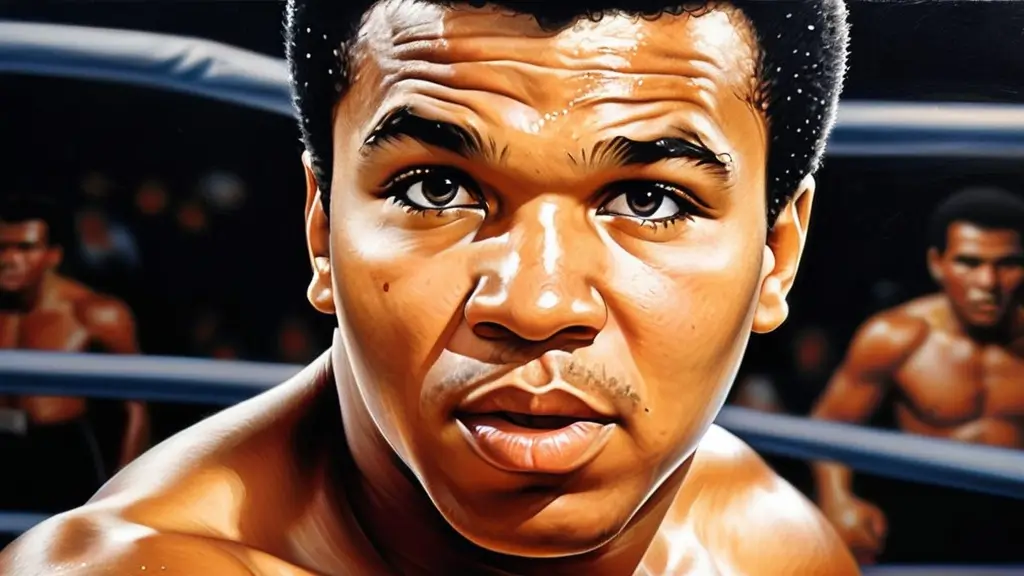Did Nikola Tesla Practice Semen Retention ? Yes, he did throughout his adult life, his is dedication to celibacy and sexual energy conservation was central to his creative process. This article will explores Tesla’s motivations, the science behind his practices, and their impact on his groundbreaking inventions.
Historical Evidence: Tesla’s Commitment to Semen Retention
Nikola Tesla’s commitment to semen retention is well-documented through his personal writings, biographical accounts, and testimonies from contemporaries. Tesla viewed celibacy as non-negotiable, framing it as essential to his creative and intellectual output. In his autobiography, My Inventions, he wrote:
“I had to make a stand and exercise willpower… The elimination of sex desire was necessary to maintain the strenuous pace I had set for myself.”
This deliberate abstention was not a fleeting experiment but a lifelong discipline spanning six decades. Tesla explicitly avoided romantic relationships, believing they would inevitably lead to marriage, which he saw as a barrier to scientific achievement. As he famously remarked:
“I do not think you can name many great inventions that have been made by married men.”
His peers often noted this conviction. Biographer Marc Seifer highlights Tesla’s refusal to marry or engage in romantic entanglements, alongside strict routines like daily 8–10 mile walks and minimal social interactions—practices he believed preserved his “vital energies.” Tesla’s avoidance of intimacy stemmed from his belief that sexual energy could be transmuted into creative force, a concept mirrored in Eastern philosophies like Brahmacharya (celibacy for spiritual growth).
Critics argue Tesla’s celibacy might have stemmed from obsessive-compulsive tendencies, given his meticulous habits (e.g., counting steps or avoiding round objects). Yet Tesla himself credited his success to this discipline, claiming it enabled 20-hour workdays during his inventive peak. His ability to visualize complex inventions like the alternating current (AC) motor without physical prototypes suggests a mind operating at extraordinary capacity—a feat he attributed to conserved energy.
Tesla’s philosophy extended beyond personal habit to a broader worldview. When asked about sex, he acknowledged its biological necessity but framed it as a distraction for thinkers:
“Nature has made its attraction irresistible to ensure the perpetuity of the species. But for myself, I have found that the thinker is confronted with the problem of perpetuating either the species or the mind. It is almost impossible, at least in certain realms of high endeavor, to do both.”

This perspective aligned with his correspondence with spiritual leaders like Swami Vivekananda, who introduced him to yogic practices. Vivekananda’s teachings on prana (life force) resonated deeply with Tesla’s belief in energy conservation. He drew parallels between Hindu practices and his own discipline, noting:
“This [choice between creation and celibacy] has been recognized by the Hindus, whose adepts practice complete sexual abstinence, and by many of the great religions.”
The synergy between Tesla’s scientific rigor and spiritual insights underscores his holistic approach to innovation. While no medical records directly confirm physiological benefits, his documented productivity—300+ patents, including foundational work on AC electricity and wireless transmission—offers indirect validation of his methods.
Key Evidence Supporting Tesla’s Practice:
- Personal Journals: Detailed accounts of energy conservation strategies.
- Biographical Records: Documented celibacy spanning 60+ years.
- Peer Testimonies: Colleagues noted his extreme focus and discipline.
Why Did Nikola Tesla Practice Semen Retention? 3 Reasons :
Tesla’s celibacy was driven by three interconnected philosophies:
- Energy Transmutation:
Tesla saw the body as a “machine” that needed optimal fuel. He compared sexual energy to electricity, stating, “The creative force in man, if not wasted, can be transmuted into genius.” This mirrors Taoist “inner alchemy,” where conserved sexual energy is redirected to the brain. Tesla’s ability to work without sleep for days aligns with this principle. - Eastern Spiritual Influence:
Tesla’s friendship with Swami Vivekananda exposed him to Vedantic concepts of prana. Vivekananda’s 1893 speech on “divine energy” resonated with Tesla’s experiments in wireless power transmission. Tesla later wrote to the Swami, “Your teachings have given me immense mental peace.” This blend of science and spirituality shaped his celibacy as a form of energy conservation. - Fear of Creative Drain:
Tesla believed relationships would sap his inventive vigor. He wrote, “I do not think you can name many great inventions made by married men.” This echoes philosopher Arthur Schopenhauer’s claim that intellectuals avoid marriage to preserve their independence. Tesla’s celibacy insulated him from emotional entanglements, allowing him to focus relentlessly on projects like the Wardenclyffe Tower.
Scientific Insights: Semen Retention Benefits Backed by Research
Modern studies offer nuanced insights into semen retention:
- Testosterone Levels: A 2003 study in Physiology & Behavior found abstaining from ejaculation for 7 days increased testosterone by 45.7%, potentially enhancing motivation and muscle mass. However, levels plateaued after a week, suggesting diminishing returns.
- Cognitive Benefits: A 2019 study in PLOS ONE investigated the neural mechanisms underlying sexual inhibition and found that inhibiting sexual thoughts and behaviors involves the prefrontal cortex, which is associated with decision-making and focus.
- Emotional Regulation: 2018 study in the Archives of Sexual Behavior explored the relationship between sexual activity and cognitive function in older adults, suggesting that sexual activity may have cognitive benefits.
Tesla’s Holistic Energy Management Routine

Tesla’s regimen extended beyond celibacy:
Physical Rituals:
- Daily Walks: 8–10 miles daily, often in parks, to stimulate creativity.
- Vegetarian Diet: To avoid “clouding mental clarity” with heavy foods.
- Cold Showers: Believed to boost circulation and alertness.
Mental Practices:
- Visualization: Mentally constructing devices like the Tesla Coil before building them.
- Memory Training: Memorizing entire books and conducting experiments in his mind.
This holistic system aimed to maximize energy efficiency, mirroring his engineering principles.
Documented Benefits of Tesla’s Practice
Tesla’s celibacy correlated with:
- Hyperfocus: Ability to work 84-hour weeks.
- Photographic Memory: Recalling complex diagrams and texts verbatim.
- Innovative Output: 300+ patents, including AC electricity and radio technology.
His productivity peaked during celibate periods, though later isolation may have hindered collaboration.
Modern Applications of Tesla’s Methods
Practical Tips:
- Trial Periods: Attempt 30-day celibacy to gauge energy shifts.
- Mindful Meditation: Channel energy via breathwork or yoga.
- Balanced Lifestyle: Avoid social isolation; maintain friendships.
Great Historical Figures Who Practiced Semen Retention
Tesla was not alone in his adherence to semen retention. History is replete with innovators, philosophers, and leaders who attributed their achievements to disciplined celibacy.
Leonardo da Vinci (1452–1519):

The Renaissance polymath maintained lifelong celibacy, believing sexual activity drained creative vitality. His journals describe “the preservation of seed” as critical to artistic and scientific mastery. Da Vinci’s unparalleled output—from The Last Supper to anatomical sketches—exemplifies his commitment to redirecting energy into work. Biographer Walter Isaacson notes that da Vinci’s celibacy allowed him to remain “obsessively focused” on dissecting cadavers and perfecting perspective in art, despite societal taboos.
Isaac Newton (1643–1727):

Newton’s celibacy was legendary; he reportedly died a virgin. His niece, Catherine Barton, remarked that Newton’s “passions were wholly subjugated to his intellect.” This singular focus enabled him to develop calculus, laws of motion, and groundbreaking optics research. Historians suggest Newton viewed sexual abstinence as a means to avoid distractions, channeling his energies into deciphering the universe’s mathematical laws.
Steve Jobs (1955–2011):

The Apple co-founder practiced periodic celibacy, influenced by Zen Buddhism and the Kundalini energy system. Jobs’ biographer, Walter Isaacson, recounts periods where Jobs avoided relationships to fuel creativity, notably during the development of the Macintosh.
Here’s what his former girlfriend said about him
“Our birth control method up to that point was Steve’s coitus interruptus, also called the pull-out method, which for him was about his conserving his energy for work,’ she wrote. He explained that he didn’t want to climax so he could build ‘power and wealth by conserving one’s vital energies.”
Muhammad Ali (1942–2016):

The boxing legend abstained from sex before major fights, a practice common among athletes seeking peak performance. Trainer Angelo Dundee noted Ali’s belief that celibacy preserved “fighting spirit” and physical stamina. Modern sports science corroborates this, linking temporary abstinence to elevated testosterone levels and aggression.
“The central part (of my training) is dodging the nightclubs and the parties and the girls. You want the truth? And being in the bed by yourself at 9 o’clock at night. If you can get by that, you’ll make it. Now that’s the truth, I tell you the truth. You talk about all that running and jogging, and hitting the bags and fighting; dodging ladies is the main thing, especially when you’re pretty like me.” –Muhammad Ali
Eastern Philosophers:
Ancient traditions like Taoism and Hinduism formalized semen retention. Taoist texts advocate “non-ejaculation” to cultivate jing (vital essence), while Hindu Brahmacharya prescribes celibacy for spiritual enlightenment. These practices influenced figures like Gandhi, who adopted celibacy at 36 to sharpen his focus on India’s independence movement.
FAQs: Addressing Common Questions
1. How Long Did Nikola Tesla Practice Semen Retention?
Tesla maintained celibacy for over 60 years, from his early 20s until his death at 86.
2. Did Tesla’s Semen Retention Affect His Social Life?
While socially reserved, Tesla maintained professional relationships, prioritizing work over sex.
Tesla’s celibacy and Its Impact on History
Nikola Tesla’s semen retention practice offers a compelling case study in energy conservation. While his approach was extreme, modern enthusiasts can adapt his principles to enhance creativity and focus. Whether through short-term celibacy or mindful energy management, Tesla’s legacy underscores the profound link between discipline and innovation.



